人教版英语必修六第二单元课文翻译
综合教程第六册Unit 2 A class act课文翻译

1。
成长在二战期间战火连天的曼彻斯特意味着生活艰辛,金钱紧缺,整日焦虑不安,当铺成了大多数家庭经常去的地方,当然也包括我家。
2.然而,我不能对已经很有进取心和积极乐观的父母有更多的要求了.他们艰辛地工作,用尊严和快乐来支撑着这个家庭。
我刚毅而又智慧的父亲几乎无所不能,而且从不缺木匠和手工艺活。
为了满足家庭开支,他甚至参加了非法组织的拳击比赛.至于我的母亲,她勤劳节约,极爱干净。
即使条件艰苦,在母亲的照料下,她的五个孩子总能吃得饱饱地,穿得干干净净地去学校。
3.尽管我的衣服熨得很平整,鞋子擦得发亮,还是不符合学校的着装标准。
尽管妈妈勤俭持家,想办法为我们做衣服,但是我还是没有学校指定的蓝色校服和帽徽。
4。
由于战争,政府实施定量配给制。
很多学校都放宽了对学生着装的要求,因为他们知道在那个时候弄到衣服是一件很困难的事情.尽管如此,我所在的女子学校对着装的要求依旧很严格,每个学生必须要穿学校指定的校服.所以,每天主持校会的副校长就把教我一个人如何着装当成了他的工作。
5。
虽然我努力地向老师说明我不能遵守的理由,并且事实上,我也在努力地改进,但是每天老师都会把我从队伍中拉出来,然后让我站到台上,作为不穿校服到学校的学生的典型。
6.每天,当我独自一人尴尬地站在同学们的面前时,我都会强忍住泪水。
为了惩罚我,老师甚至不允许我参加体操队,也不允许我参加我最喜欢的每周一次的交易舞会。
我多么希望在这所可怕的学校里,能有这样一位老师,他会睁开双眼,然后看看我会做什么,而不是不断地告诉我不能做什么。
7。
然而,在我十二岁的记忆中,除了接受惩罚我别无选择。
不要让我善良的母亲知晓这种惯例的惩罚对我而言是很重要的,我不敢冒险让她来学校为我说情,因为我知道心胸狭隘、不讲情面的教员会同样地使她难堪,那意味着我们俩都会不愉快、会有失颜面.千万不要啊,如果她告诉我父亲的话,他将会立即为我大动干戈。
10.后来有一天,我们家赢得了一个报刊比赛,可以免费照相。
高中英语课文人教版必修六翻译
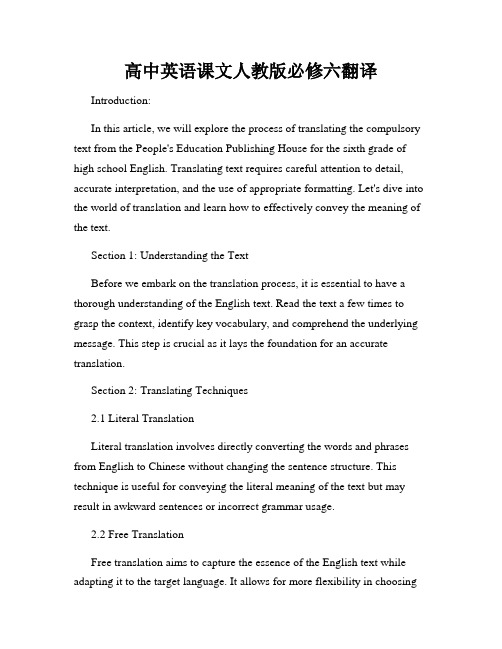
高中英语课文人教版必修六翻译Introduction:In this article, we will explore the process of translating the compulsory text from the People's Education Publishing House for the sixth grade of high school English. Translating text requires careful attention to detail, accurate interpretation, and the use of appropriate formatting. Let's dive into the world of translation and learn how to effectively convey the meaning of the text.Section 1: Understanding the TextBefore we embark on the translation process, it is essential to have a thorough understanding of the English text. Read the text a few times to grasp the context, identify key vocabulary, and comprehend the underlying message. This step is crucial as it lays the foundation for an accurate translation.Section 2: Translating Techniques2.1 Literal TranslationLiteral translation involves directly converting the words and phrases from English to Chinese without changing the sentence structure. This technique is useful for conveying the literal meaning of the text but may result in awkward sentences or incorrect grammar usage.2.2 Free TranslationFree translation aims to capture the essence of the English text while adapting it to the target language. It allows for more flexibility in choosingappropriate words and expressions that best convey the intended meaning. This technique requires a deep understanding of both languages to ensure accurate communication.Section 3: Formatting Considerations3.1 Headings and SubheadingsWhen translating the text, it is essential to maintain a clean and organized structure. Use headings and subheadings to divide the text into logical sections, providing a clear overview to the reader. The choice of headings should reflect the content accurately.3.2 Paragraphs and Line SpacingTo enhance readability, ensure that each translated paragraph focuses on a specific idea or topic. Maintain a consistent line spacing throughout the text to avoid overcrowding and aid comprehension.Section 4: Honing the Translation4.1 Proofreading and EditingAfter completing the initial translation, it is crucial to thoroughly proofread the text. Pay attention to grammar, sentence structure, punctuation, and word choice. Editing any errors or inconsistencies will ensure the final translation is accurate and aesthetically pleasing.4.2 Cultural AdaptationTranslate the text in a way that respects cultural differences and customs. Consider adapting idioms, phrases, or cultural references to make the text more relatable to the target audience.Conclusion:Translating the compulsory text from the People's Education Publishing House for the sixth grade of high school English requires a careful balance of linguistic accuracy, appropriate formatting, and cultural adaptation. By following the techniques and considerations outlined in this article, we can successfully convey the meaning and message of the text in an elegant and effective manner. Happy translating!。
人教版英语选修6课文原文及课文译文
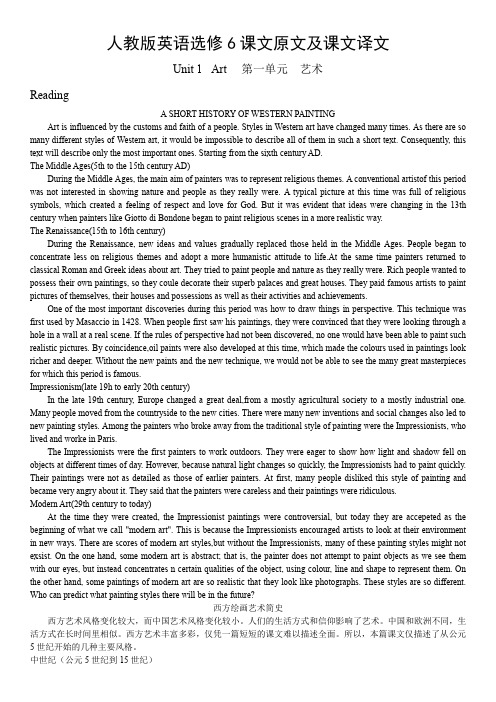
人教版英语选修6课文原文及课文译文Unit1 Art第一单元艺术ReadingA SHORT HISTORY OF WESTERN PAINTINGArt is influenced by the customs and faith of a people. Styles in Western art have changed many times. As there are so many different styles of Western art, it would be impossible to describe all of them in such a short text. Consequently, this text will describe only the most important ones. Starting from the sixth century AD.The Middle Ages(5th to the 15th century AD)During the Middle Ages, the main aim of painters was to represent religious themes. A conventional artistof this period was not interested in showing nature and people as they really were. A typical picture at this time was full of religious symbols, which created a feeling of respect and love for God. But it was evident that ideas were changing in the 13th century when painters like Giotto di Bondone began to paint religious scenes in a more realistic way.The Renaissance(15th to 16th century)During the Renaissance, new ideas and values gradually replaced those held in the Middle Ages. People began to concentrate less on religious themes and adopt a more humanistic attitude to life.At the same time painters returned to classical Roman and Greek ideas about art. They tried to paint people and nature as they really were. Rich people wanted to possess their own paintings, so they coule decorate their superb palaces and great houses. They paid famous artists to paint pictures of themselves, their houses and possessions as well as their activities and achievements.One of the most important discoveries during this period was how to draw things in perspective. This technique was first used by Masaccio in 1428. When people first saw his paintings, they were convinced that they were looking through a hole in a wall at a real scene. If the rules of perspective had not been discovered, no one would have been able to paint such realistic pictures. By coincidence,oil paints were also developed at this time, which made the colours used in paintings look richer and deeper. Without the new paints and the new technique, we would not be able to see the many great masterpieces for which this period is famous.Impressionism(late 19h to early 20th century)In the late 19th century, Europe changed a great deal,from a mostly agricultural society to a mostly industrial one. Many people moved from the countryside to the new cities. There were many new inventions and social changes also led to new painting styles. Among the painters who broke away from the traditional style of painting were the Impressionists, who lived and worke in Paris.The Impressionists were the first painters to work outdoors. They were eager to show how light and shadow fell on objects at different times of day. However, because natural light changes so quickly, the Impressionists had to paint quickly. Their paintings were not as detailed as those of earlier painters. At first, many people disliked this style of painting and became very angry about it. They said that the painters were careless and their paintings were ridiculous.Modern Art(29th century to today)At the time they were created, the Impressionist paintings were controversial, but today they are accepeted as the beginning of what we call "modern art". This is because the Impressionists encouraged artists to look at their environment in new ways. There are scores of modern art styles,but without the Impressionists, many of these painting styles might not exsist. On the one hand, some modern art is abstract; that is, the painter does not attempt to paint objects as we see them with our eyes, but instead concentrates n certain qualities of the object, using colour, line and shape to represent them. On the other hand, some paintings of modern art are so realistic that they look like photographs. These styles are so different. Who can predict what painting styles there will be in the future?西方绘画艺术简史西方艺术风格变化较大,而中国艺术风格变化较小。
高中英语课文人教版必修六翻译
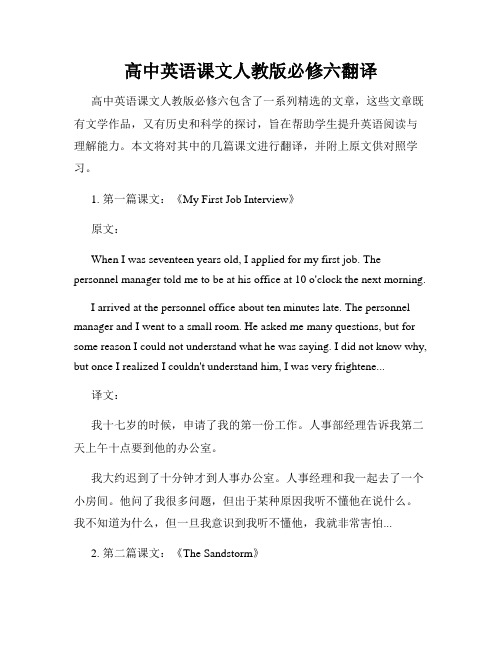
高中英语课文人教版必修六翻译高中英语课文人教版必修六包含了一系列精选的文章,这些文章既有文学作品,又有历史和科学的探讨,旨在帮助学生提升英语阅读与理解能力。
本文将对其中的几篇课文进行翻译,并附上原文供对照学习。
1. 第一篇课文:《My First Job Interview》原文:When I was seventeen years old, I applied for my first job. The personnel manager told me to be at his office at 10 o'clock the next morning.I arrived at the personnel office about ten minutes late. The personnel manager and I went to a small room. He asked me many questions, but for some reason I could not understand what he was saying. I did not know why, but once I realized I couldn't understand him, I was very frightene...译文:我十七岁的时候,申请了我的第一份工作。
人事部经理告诉我第二天上午十点要到他的办公室。
我大约迟到了十分钟才到人事办公室。
人事经理和我一起去了一个小房间。
他问了我很多问题,但出于某种原因我听不懂他在说什么。
我不知道为什么,但一旦我意识到我听不懂他,我就非常害怕...2. 第二篇课文:《The Sandstorm》原文:Thousands of tourists were caught by surprise on Friday when a huge sandstorm struck a popular city in the middle of China. The city was totally covered by a thick layer of yellow sand and visibility dropped to less than 50 meters.The sandstorm, which appeared suddenly, caused chaos in the city. Many people rushed into stores and buildings for shelter, while others had to cover their faces with towels to protect themselves from the flying sand. Traffic was also greatly affected...译文:上周五,数千名游客在中国中部的一座热门城市遭遇了一场巨大的沙尘暴,他们大为震惊。
人教版六年级上册英语教材课文翻译Unit1~3

人教版六年级上册英语教材课文翻译Unit1~3人教版六年级上册英语教材课文翻译U n i t1~3R e c y c l e 1 Unit1 How can I get thereHey,Robin. Where is the science museum嘿,罗宾。
科学博物馆在哪儿?It's near the library.它在图书馆附近。
I see. How can I get there 我知道了。
我怎么到那儿?Turn right at the school. Then go straight.到学校右转。
然后直走。
OK. Let's go.好的。
让我们走吧。
Excuse me. Can you help me打扰一下,你能帮助我吗?Sure.当然。
How can I get to the science museum 我怎么到科学博物馆?It's over there.它在那边。
Thanks.谢谢。
Oh, where is Robin哦,罗宾在哪儿?P4 Let's tryWu Yifan and Robin are looking at some robots. Listen and tick.吴一凡和罗宾正在看一些机器人。
听一听并打钩。
1.Where are they 他们在哪儿?In the museum.在博物馆里。
In the bookstore 在书店里。
2.Is Grandpa there (外)祖父在那儿吗?Yes,he is.是的,他在。
No,he isn't.不,他不在。
P4 Let's talk部分翻译Wu Yifan:Robin,where is the museum shop I want to buy a postcard.吴一凡:罗宾,博物馆的商店在哪儿?我想要买一张明信片。
Robin:It's near the door.罗宾:在大门附近。
人教版高中英语选修6 Unit 2 Language points
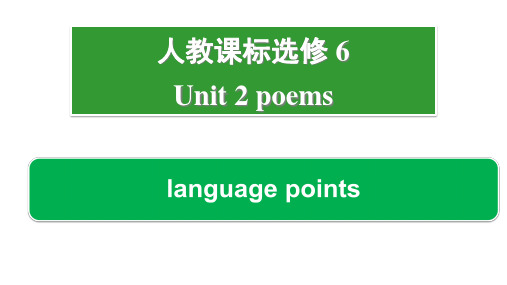
continue to next
Don't take what she said seriously — she was only teasing.
别拿她的话当真--她不过是逗弄人。
The cat scratches if you tease her. 你逗弄猫,猫会抓你。 tease = laugh at = make fun of vi. & vt. 取笑;招惹;
Children used to learn by repetition.
repetition
n. 重复;反复
他反复打电话,求她回来。(翻译)
He telephoned repeatedly, begging her to return. repeatedly ad. 反覆地,再三地 受害者胸部被多次刺伤。(翻译)
She answered in a voice filled with emotion.
她以激动的声音回答。 emotionn. 激动; 感动
续写
她激动得声音发抖。(翻译)
Her voice trembled with emotion. with emotion 情绪激动地
Her voice was choked with emotion. 她激动得说不出话来。
old. 人老了肌肉的柔韧性将降低。
语法填空
Workers insisted the new system was too __________ (flexible).
工人们坚持认为新制度太不灵活。
inflexible a.不可弯曲的;不灵活的 inflexibility n. 不屈性; 不变性; 顽固
戏弄
别的男孩子常拿他的口音取笑他。 The other boys used to tease him about his accent. tease sb. about sth. 嘲笑某人……;拿某人的……开玩笑
高中英语人教版选修六 Unit2 精读课文逐句翻译
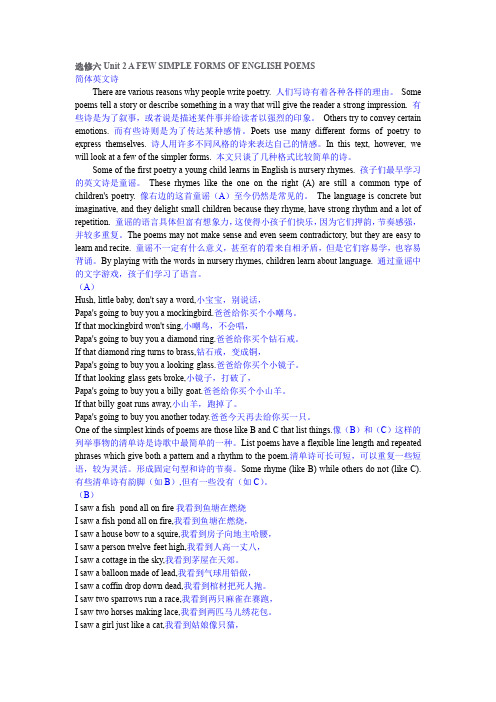
选修六Unit 2 A FEW SIMPLE FORMS OF ENGLISH POEMS简体英文诗There are various reasons why people write poetry. 人们写诗有着各种各样的理由。
Some poems tell a story or describe something in a way that will give the reader a strong impression. 有些诗是为了叙事,或者说是描述某件事并给读者以强烈的印象。
Others try to convey certain emotions. 而有些诗则是为了传达某种感情。
Poets use many different forms of poetry to express themselves. 诗人用许多不同风格的诗来表达自己的情感。
In this text, however, we will look at a few of the simpler forms. 本文只谈了几种格式比较简单的诗。
Some of the first poetry a young child learns in English is nursery rhymes. 孩子们最早学习的英文诗是童谣。
These rhymes like the one on the right (A) are still a common type of children's poetry. 像右边的这首童谣(A)至今仍然是常见的。
The language is concrete but imaginative, and they delight small children because they rhyme, have strong rhythm and a lot of repetition. 童谣的语言具体但富有想象力,这使得小孩子们快乐,因为它们押韵,节奏感强,并较多重复。
人教版高中英语选修六课文翻译

人教版高中英语选修六课文翻译课文一:《双全》《双全》是人教版高中英语选修六的一篇课文。
下面是对这篇课文的翻译。
双全霍拉斯对伊卡鲁斯说:“孩子,别相信别人,自己动手。
” 天生具备了许多能力的人类,自从获得了火以后,便变得十分强大。
火让人类能够驱散黑暗,煮食食物并使其更易消化,还可以取暖。
火是人类的好朋友,我们对它拥有强烈的依赖。
霍拉斯因此告诫自己的朋友伊卡鲁斯,不要相信别人,要自己动手。
这句话充满了智慧,让人们明白只有依靠自己,才能实现自己的梦想和目标。
与其依赖他人,不如自己去争取自己想要的东西。
那些凭空指望别人帮助自己的人,往往只会失望。
课文二:《白宫的历史》《白宫的历史》是人教版高中英语选修六的另一篇课文。
下面是对这篇课文的翻译。
白宫的历史白宫位于美国首都华盛顿特区的宾夕法尼亚大道上,是美国总统的官邸和办公地点。
白宫不仅是美国政治的象征,也是美国历史的重要见证。
白宫建于18世纪的末期,由于历经数次扩建和改造,使得白宫成为了一座壮丽的建筑。
它不仅有着独特的建筑风格,也拥有丰富的文化和艺术价值。
白宫见证了美国历史上许多重要的事件,包括战争、签署重要文件以及重要外交活动。
作为美国总统的官邸,白宫承载着巨大的政治和历史责任。
每一位居住在白宫的总统,都必须对国家和人民负责,并代表美国在国际上发声。
无论是美国国内还是国际社会,人们对白宫都怀有敬畏之情。
它代表了美国的权力和价值观,也见证了美国作为世界强国的崛起和发展。
课文三:《古代埃及》《古代埃及》是人教版高中英语选修六的又一篇课文。
下面是对这篇课文的翻译。
古代埃及埃及是位于非洲东北部的一个古老国家,拥有悠久的历史和文化。
古埃及文明以其庞大的建筑、艺术和神秘的法老文化而闻名于世。
古埃及的法老被认为是神与王的化身,享有至高无上的权力。
法老的陵墓和金字塔的建造是古埃及文明的一大成就。
埃及的金字塔迄今仍然是世界上的奇迹之一,吸引着来自世界各地的游客。
埃及的神庙和雕塑也是古埃及文化的重要遗产。
人教版PEP六年级英语Unit 2 Last Weekend第二单元全文翻译
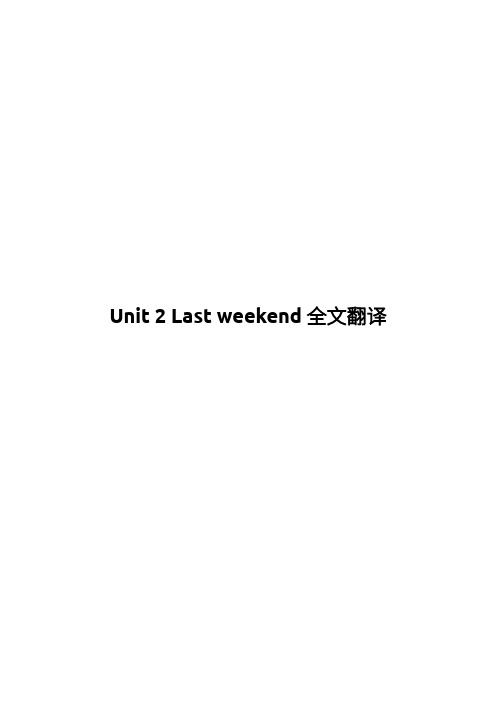
Unit 2 Last weekend 全文翻译Unit2《Last Weekend》Main生词本1. weekend 周末2. clean 打扫3. play football 踢足球4. wash 洗课文翻译Last weekend上周末What did you do last weekend?你上周末干什么了?I cleaned my room and washed my clothes on Saturday.我星期六打扫了房间,还洗了衣服。
Did you play football with Zhang Peng?你跟张鹏踢足球了吗?Yes, I did.是的,我踢了。
We played football on Sunday.我们星期日踢足球了。
Unit2 A Let's try & Let's talk生词本1.cleaned (clean的过去式)打扫2.stayed (stay的过去式)停留;待3.washed (wash的过去式)洗4.watched (watch的过去式)看课文翻译A Let's trySarah and Mike are talking about this weekend. Listen and circle.萨拉和麦克正在谈论这个周末。
听录音,圈出正确的答案。
Tomorrow is Monday.明天是星期一。
We will have class again soon.我们很快又要上课了。
Yes, we will. 是的。
How was your weekend, Mike?你周末过得怎么样,麦克?It was OK. 很好!I cleaned my room, and I watched TV.我打扫了房间,还看了电视。
I'm going to call my grandparents now.我现在要给我的爷爷奶奶打电话。
高中英语人教版选修六Unit2泛读课文逐句翻译
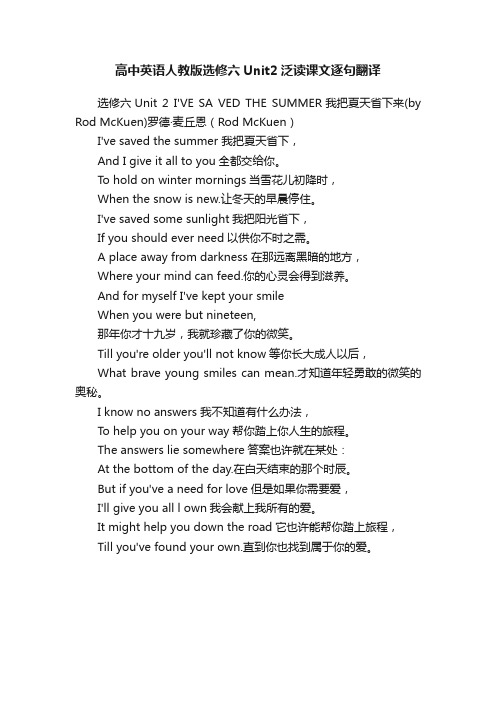
高中英语人教版选修六Unit2泛读课文逐句翻译选修六Unit 2 I'VE SA VED THE SUMMER我把夏天省下来(by Rod McKuen)罗德·麦丘恩(Rod McKuen)I've saved the summer 我把夏天省下,And I give it all to you全都交给你。
To hold on winter mornings当雪花儿初降时,When the snow is new.让冬天的早晨停住。
I've saved some sunlight我把阳光省下,If you should ever need以供你不时之需。
A place away from darkness 在那远离黑暗的地方,Where your mind can feed.你的心灵会得到滋养。
And for myself I've kept your smileWhen you were but nineteen,那年你才十九岁,我就珍藏了你的微笑。
Till you're older you'll not know等你长大成人以后,What brave young smiles can mean.才知道年轻勇敢的微笑的奥秘。
I know no answers 我不知道有什么办法,To help you on your way帮你踏上你人生的旅程。
The answers lie somewhere答案也许就在某处:At the bottom of the day.在白天结束的那个时辰。
But if you've a need for love但是如果你需要爱,I'll give you all l own我会献上我所有的爱。
It might help you down the road它也许能帮你踏上旅程,Till you've found your own.直到你也找到属于你的爱。
新人教版高中英语必修6Unit 2 Poems
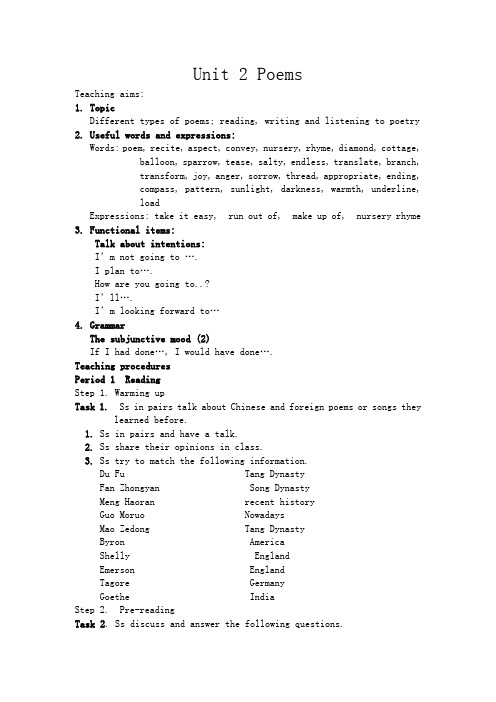
Unit 2 PoemsTeaching aims:1.TopicDifferent types of poems; reading, writing and listening to poetry eful words and expressions:Words: poem, recite, aspect, convey, nursery, rhyme, diamond, cottage, balloon, sparrow, tease, salty, endless, translate, branch,transform, joy, anger, sorrow, thread, appropriate, ending,compass, pattern, sunlight, darkness, warmth, underline,loadExpressions: take it easy, run out of, make up of, nursery rhyme 3.Functional items:Talk about intentions:I’m not going to ….I plan to….How are you going to..?I’ll….I’m looking forward to…4.GrammarThe subjunctive mood (2)If I had done…, I would have done….Teaching proceduresPeriod 1 ReadingStep 1. Warming upTask 1. Ss in pairs talk about Chinese and foreign poems or songs they learned before.1.Ss in pairs and have a talk.2.Ss share their opinions in class.3.Ss try to match the following information.Du Fu Tang DynastyFan Zhongyan Song DynastyMeng Haoran recent historyGuo Moruo NowadaysMao Zedong Tang DynastyByron AmericaShelly EnglandEmerson EnglandTagore GermanyGoethe IndiaStep 2. Pre-readingTask 2. Ss discuss and answer the following questions.1.Why do people write poems?Sample answers:t o express one’s hopes and intentions;to call up people to do something;to practice writing; to pour out one’s feelings;to show dissatisfaction or praise…2.People from different countries write different kinds of poems. Doyou have a favourite poem in Chinese? Why is it your favourite poem?Do you have a favourite poem in English? Why is it your favourite poem?Step 3. ReadingTask 3: First reading: Ss skim the poems and fill in the following11.Sample answers:1.The main topic of the reading passage: different forms of Englishpoems.2.Nursery rhymes; list poems; cinquain; haiku; Tang poems.3.Poem A has a strong rhythm. Poems A and B have rhyming lines.4.Poem F gives a clear picture in the mind.Task 6: Ss listen to the recording of the passage and try clapping the beats. Then answer the questions on page 12.Sample answers:1.If the mirror gets broken, the baby’s father will buy a billy-goatinstead.2.If the goat runs away, the baby’s father will buy another goat.3.The speaker is writing about football.4.No, his or her team didn’t win.5.The players didn’t win because: Jack didn’t score that goal; theydidn’t have enough time; they hadn’t train hard….6.The speaker doesn’t really believe his or her own excuses, becausethere has too many ifs…7.Yes. I always give excuses when I don’t win or do something.No. I’ve never given any excuses when I don’t win or do something.8.The poem tells a story about a woman who was waiting on the mountaintop foe her husband. The story goes like this: A loyal wife kept standing on a mountain top waiting for her husband’s coming back.Year after year the wife became a stone which looks like a woman watching into far distance.9.The woman has the feelings of :loneliness: she was alone watching her husband on the mountain top.Love: she waited year after year despite wind and rain.Trust: she believed her husband would come back one day.Sorrow: year after year, she waited and waited without seeing any hope of her husband’s coming back, she was very sad.Period nguage learningStep 1. RevisionSs in pairs talk about the different kinds of poems.Step 2. Language points1.repetition: repeat + ition常见的名词后缀有:-ition, -ance, -al, -tion, -ment等expose – exposition add- additionappear – appearance resist – resistancearrive – arrival refuse – refusalcreate – creation explain – explanationagree – agreement argue – argument2.bow to sb. 向某人鞠躬;屈服于he bowed to the Queen.I’m not at all happy about it, but I think I’l l have to bow to the inevitable.3.We would have won if Jack had scored that goal.本句用的是虚拟语气过去式,即假设一个与过去事实相反的条件。
高中英语课文人教版必修六翻译
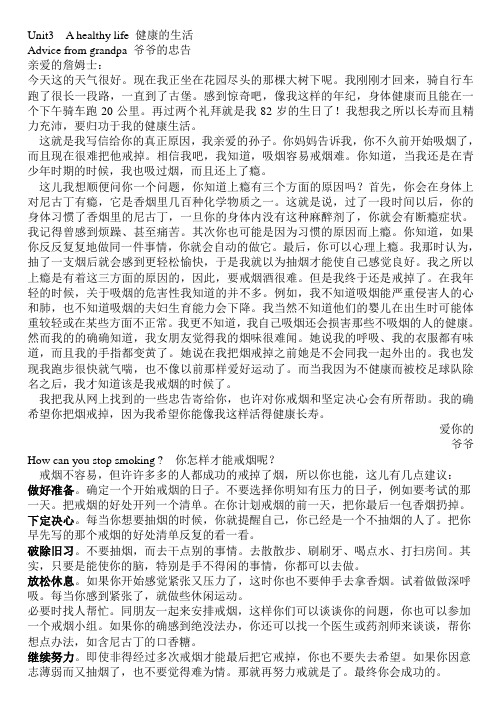
Unit3 A healthy life 健康的生活Advice from grandpa 爷爷的忠告亲爱的詹姆士:今天这的天气很好。
现在我正坐在花园尽头的那棵大树下呢。
我刚刚才回来,骑自行车跑了很长一段路,一直到了古堡。
感到惊奇吧,像我这样的年纪,身体健康而且能在一个下午骑车跑20公里。
再过两个礼拜就是我82岁的生日了!我想我之所以长寿而且精力充沛,要归功于我的健康生活。
这就是我写信给你的真正原因,我亲爱的孙子。
你妈妈告诉我,你不久前开始吸烟了,而且现在很难把他戒掉。
相信我吧,我知道,吸烟容易戒烟难。
你知道,当我还是在青少年时期的时候,我也吸过烟,而且还上了瘾。
这儿我想顺便问你一个问题,你知道上瘾有三个方面的原因吗?首先,你会在身体上对尼古丁有瘾,它是香烟里几百种化学物质之一。
这就是说,过了一段时间以后,你的身体习惯了香烟里的尼古丁,一旦你的身体内没有这种麻醉剂了,你就会有断瘾症状。
我记得曾感到烦躁、甚至痛苦。
其次你也可能是因为习惯的原因而上瘾。
你知道,如果你反反复复地做同一件事情,你就会自动的做它。
最后,你可以心理上瘾。
我那时认为,抽了一支烟后就会感到更轻松愉快,于是我就以为抽烟才能使自己感觉良好。
我之所以上瘾是有着这三方面的原因的,因此,要戒烟酒很难。
但是我终于还是戒掉了。
在我年轻的时候,关于吸烟的危害性我知道的并不多。
例如,我不知道吸烟能严重侵害人的心和肺,也不知道吸烟的夫妇生育能力会下降。
我当然不知道他们的婴儿在出生时可能体重较轻或在某些方面不正常。
我更不知道,我自己吸烟还会损害那些不吸烟的人的健康。
然而我的的确确知道,我女朋友觉得我的烟味很难闻。
她说我的呼吸、我的衣服都有味道,而且我的手指都变黄了。
她说在我把烟戒掉之前她是不会同我一起外出的。
我也发现我跑步很快就气喘,也不像以前那样爱好运动了。
而当我因为不健康而被校足球队除名之后,我才知道该是我戒烟的时候了。
我把我从网上找到的一些忠告寄给你,也许对你戒烟和坚定决心会有所帮助。
人教版高中英语必修六Unit2 Poems课文全解

人教版高中英语必修六Unit2 Poems课文全解(常考单词、高频短语和写作句式)Ⅰ. 常考单词必背1.convey vt. 传达;运送I can't convey my feelings in words.我无法用言语来表达我的情感。
[快速闪记](1) 同义词:carry,convey,transfer,transmit,transport(2) convey to将……运往〔送往〕(某地);把……传达给(某人) convey sth to sb 向某人表达/传递某物convey sb/sth from A to B 把某人或某物从A地运送到B地convey one's feelings/meanings 表达某人的感情/意思2.concrete adj. 具体的 n. 水泥;混凝土As we were leaving,we found that only minutes earlier an elderly woman had fallen over at the entrance and had hit her head on the concrete.我们要离开的时候,发现就在几分钟前,一位老妇人在入口处跌倒了且其头部撞在了水泥地上。
3.flexible adj. 灵活的;易弯曲的;柔韧的Good job candidates must show a flexible approach to problems. 优秀的求职人员必须表明自己能以灵活的方法解决问题。
4.tease v.取笑;招惹;戏弄Don't take what he said seriously;he was only teasing.别拿他的话当真,他不过是开玩笑。
5.eventually adv. 终于;最后eventual adj. 最后的;最终的At the moment the building is empty,but eventually there will be a five-star hotel.目前这座建筑物是空的,但这儿最终将会成为一个五星级宾馆。
人教版六年级下册英语unit2教材第1213课文翻译

人教版六年级下册英语unit2教材第12-13页课文翻译unit2教材第12页课文翻译Mike迈克Saturday星期六Sunday星期日 April 5th四月五日 Wow!哇!2unit2教材第13页课文翻译Sunday星期日Saturday星期April 5th四月五日April 6th四月六日John约翰What did you do last weekend?您上周末干什么了?I cleaned my room and washed my clothes on Saturday、我在星期六打扫了我的房间,还洗了我的衣服。
Did you play football with Zhang Peng?您与张鹏踢足球了不?Yes,I did、 We played football on Sunday、就是的,我与张鹏踢足球了。
我们在星期日踢足球了。
let's try部分翻译 Sarah and Mike are talking about this weekend、 Listen and circle、萨拉与迈克正在谈论这个周末。
听一听,圈一圈。
1、Sarah and Mike are talking on ___、萨拉与迈克正在谈论___。
A、 Saturday星期六B、 Sunday 星期日2、Who is Mike going to call? 迈克将要给谁打电话?A His grandparents、她的(外)祖父母。
B、 His parents、她的父母。
2let's talk部分翻译Mike:Hi,Grandpa、 How are you? How was your weekend? 迈克:嗨,爷爷。
您好不?您周末过得怎么样?Grandpa:I'm fine,Mike、 It was good,thank you、爷爷:我很好,迈克。
很好,谢谢您。
Mike:What did you do? 迈克:您(周末)干什么了?Grandpa:Well,I stayed at home with your grandma、 We drank tea in the afternoon and watched TV、爷爷:好吧,我与您奶奶待在家里。
人版六年级下册英语unit2教材第12_13页课文翻译
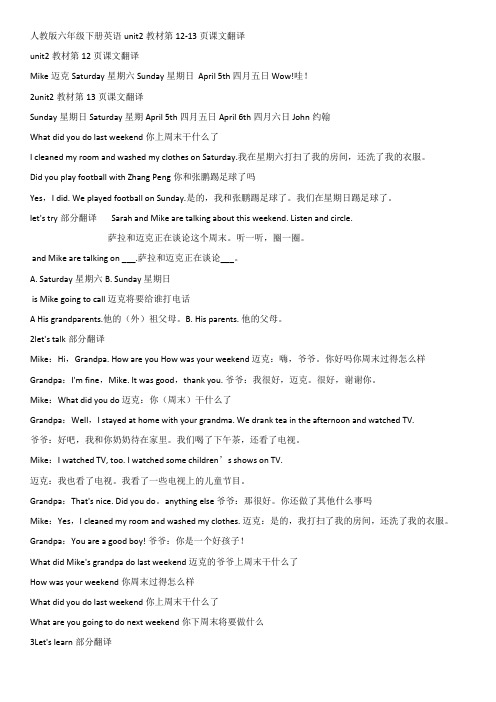
人教版六年级下册英语unit2教材第12-13页课文翻译unit2教材第12页课文翻译Mike迈克Saturday星期六Sunday星期日 April 5th四月五日 Wow!哇!2unit2教材第13页课文翻译Sunday星期日Saturday星期April 5th四月五日April 6th四月六日John约翰What did you do last weekend你上周末干什么了I cleaned my room and washed my clothes on Saturday.我在星期六打扫了我的房间,还洗了我的衣服。
Did you play football with Zhang Peng你和张鹏踢足球了吗Yes,I did. We played football on Sunday.是的,我和张鹏踢足球了。
我们在星期日踢足球了。
let's try部分翻译 Sarah and Mike are talking about this weekend. Listen and circle.萨拉和迈克正在谈论这个周末。
听一听,圈一圈。
and Mike are talking on ___.萨拉和迈克正在谈论___。
A. Saturday星期六B. Sunday 星期日is Mike going to call 迈克将要给谁打电话A His grandparents.他的(外)祖父母。
B. His parents. 他的父母。
2let's talk部分翻译Mike:Hi,Grandpa. How are you How was your weekend 迈克:嗨,爷爷。
你好吗你周末过得怎么样Grandpa:I'm fine,Mike. It was good,thank you. 爷爷:我很好,迈克。
很好,谢谢你。
Mike:What did you do 迈克:你(周末)干什么了Grandpa:Well,I stayed at home with your grandma. We drank tea in the afternoon and watched TV.爷爷:好吧,我和你奶奶待在家里。
高中英语课文翻译(人教版必修六)
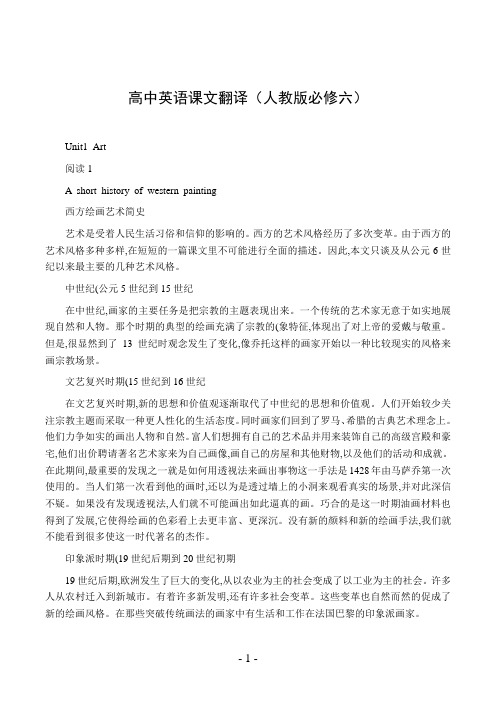
高中英语课文翻译(人教版必修六)Unit1 Art阅读1A short history of western painting西方绘画艺术简史艺术是受着人民生活习俗和信仰的影响的。
西方的艺术风格经历了多次变革。
由于西方的艺术风格多种多样,在短短的一篇课文里不可能进行全面的描述。
因此,本文只谈及从公元6世纪以来最主要的几种艺术风格。
中世纪(公元5世纪到15世纪在中世纪,画家的主要任务是把宗教的主题表现出来。
一个传统的艺术家无意于如实地展现自然和人物。
那个时期的典型的绘画充满了宗教的(象特征,体现出了对上帝的爱戴与敬重。
但是,很显然到了13世纪时观念发生了变化,像乔托这样的画家开始以一种比较现实的风格来画宗教场景。
文艺复兴时期(15世纪到16世纪在文艺复兴时期,新的思想和价值观逐渐取代了中世纪的思想和价值观。
人们开始较少关注宗教主题而采取一种更人性化的生活态度。
同时画家们回到了罗马、希腊的古典艺术理念上。
他们力争如实的画出人物和自然。
富人们想拥有自己的艺术品并用来装饰自己的高级宫殿和豪宅,他们出价聘请著名艺术家来为自己画像,画自己的房屋和其他财物,以及他们的活动和成就。
在此期间,最重要的发现之一就是如何用透视法来画出事物这一手法是1428年由马萨乔第一次使用的。
当人们第一次看到他的画时,还以为是透过墙上的小洞来观看真实的场景,并对此深信不疑。
如果没有发现透视法,人们就不可能画出如此逼真的画。
巧合的是这一时期油画材料也得到了发展,它使得绘画的色彩看上去更丰富、更深沉。
没有新的颜料和新的绘画手法,我们就不能看到很多使这一时代著名的杰作。
印象派时期(19世纪后期到20世纪初期19世纪后期,欧洲发生了巨大的变化,从以农业为主的社会变成了以工业为主的社会。
许多人从农村迁入到新城市。
有着许多新发明,还有许多社会变革。
这些变革也自然而然的促成了新的绘画风格。
在那些突破传统画法的画家中有生活和工作在法国巴黎的印象派画家。
人版六年级下册英语unit2教材第12-13页课文翻译

人教版六年级下册英语unit2教材第12-13页课文翻译unit2教材第12页课文翻译Mike迈克Saturday星期六Sunday星期日 April 5th四月五日 Wow!哇!2unit2教材第13页课文翻译Sunday星期日Saturday星期April 5th四月五日April 6th四月六日John约翰What did you do last weekend?你上周末干什么了?I cleaned my room and washed my clothes on Saturday.我在星期六打扫了我的房间,还洗了我的衣服。
Did you play football with Zhang Peng?你和张鹏踢足球了吗?Yes,I did. We played football on Sunday.是的,我和张鹏踢足球了。
我们在星期日踢足球了。
let's try部分翻译 Sarah and Mike are talking about this weekend. Listen and circle.萨拉和迈克正在谈论这个周末。
听一听,圈一圈。
1.Sarah and Mike are talking on ___.萨拉和迈克正在谈论___。
A. Saturday星期六B. Sunday 星期日2.Who is Mike going to call? 迈克将要给谁打电话?A His grandparents.他的(外)祖父母。
B. His parents. 他的父母。
2let's talk部分翻译Mike:Hi,Grandpa. How are you? How was your weekend? 迈克:嗨,爷爷。
你好吗?你周末过得怎么样?Grandpa:I'm fine,Mike. It was good,thank you. 爷爷:我很好,迈克。
很好,谢谢你。
Mike:What did you do? 迈克:你(周末)干什么了?Grandpa:Well,I stayed at home with your grandma. We drank tea in the afternoon and watched TV.爷爷:好吧,我和你奶奶待在家里。
人教版高中英语选修6课文逐句翻译(2020年,Word版)
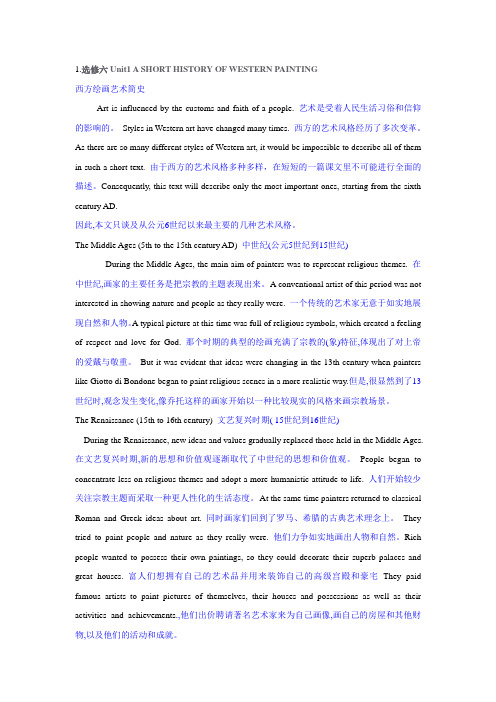
1.选修六Unit1 A SHORT HISTORY OF WESTERN PAINTING西方绘画艺术简史Art is influenced by the customs and faith of a people. 艺术是受着人民生活习俗和信仰的影响的。
Styles in Western art have changed many times. 西方的艺术风格经历了多次变革。
As there are so many different styles of Western art, it would be impossible to describe all of them in such a short text. 由于西方的艺术风格多种多样,在短短的一篇课文里不可能进行全面的描述。
Consequently, this text will describe only the most important ones, starting from the sixth century AD.因此,本文只谈及从公元6世纪以来最主要的几种艺术风格。
The Middle Ages (5th to the 15th century AD) 中世纪(公元5世纪到15世纪)During the Middle Ages, the main aim of painters was to represent religious themes. 在中世纪,画家的主要任务是把宗教的主题表现出来。
A conventional artist of this period was not interested in showing nature and people as they really were. 一个传统的艺术家无意于如实地展现自然和人物。
A typical picture at this time was full of religious symbols, which created a feeling of respect and love for God. 那个时期的典型的绘画充满了宗教的(象)特征,体现出了对上帝的爱戴与敬重。
人教版必修6 unit2 P2 Reading
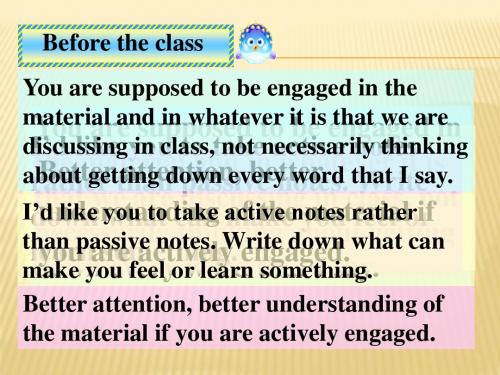
Unit 2 Reading
A FEW SIMPLE FORMS OF ENGLISH POEMS
Read the explanation and speak out the word it explains.
to express a thought, feeling or idea so that it is understood by other people; to take or carry someone or sth. to a particular place vt. 传达; 运送 convey a place where young children and babies are taken care of while their parents are nursery n. 托儿所 at work clear and certain, or real and existing in a form that can be seen or felt concrete adj. 具体的
one of the parts of a tree that grows out from the main trunk and has leaves, flowers or fruit on it; a part of a river or road that leaves the main part; one of the offices or groups that form part of a large business organization n. 枝条;支流;部门 branch
Before the class You are supposed to be engaged in the material and in whatever it is that we are You are supposed to be engaged in discussing in class, not necessarily thinking I‘d like you to take active notes the material and in whatever it is Better attention, better about getting down every word that I say. rather than passive notes. Write that we are discussing in class, not I‘d like you to take notes rather understanding of the material if down what can active make you feel or necessarily thinking about getting than passive notes. Write down what can learn something. you are actively engaged. down every word I say. make you feel or learn that something. Better attention, better understanding of the material if you are actively engaged.
- 1、下载文档前请自行甄别文档内容的完整性,平台不提供额外的编辑、内容补充、找答案等附加服务。
- 2、"仅部分预览"的文档,不可在线预览部分如存在完整性等问题,可反馈申请退款(可完整预览的文档不适用该条件!)。
- 3、如文档侵犯您的权益,请联系客服反馈,我们会尽快为您处理(人工客服工作时间:9:00-18:30)。
C我们第一次足球比赛
我们将赢… 如果杰克进了那个球 如果我们当时有多几分钟 如果我们有刻苦(训练) 如果本已经将球传给了乔 如果我们有成千上万的歌迷尖叫 如果我的眼睛没有从球上面一开 如果我们前一晚没有呆很晚还不睡 如果我们没有掉以轻心 如果我们还没有用尽能量 我们将赢… 如果我们一直更好!
我看见一个fish-portal都着火了 我看见一个fish-pond所有着火 我看到了一间房子的乡绅 我看见了一个人twelve-feet高 我看见一幢小别墅,在天空中 我看见一个气球铅作的 我看到棺材掉下来死了 我看见两个麻雀要赛跑 我看到两个马在绣花包 我看见的女孩就像一只猫 我看见一只小猫戴帽子 我看见一个男人也看见这些 他说虽然奇怪,但所有都是真实的。
另一个简单形式的诗,学生能轻易写一首诗,是cinquain 5线。与这些,学生可以传达一个强大的图片在短短几句话。看看这个例子(D,E)的顶端上显示的页面。
D爱美,爱运动,兄弟,喊著说:我的朋友和敌人也笑了
E夏天,昏昏欲睡,咸渴,萎靡,畏惧,周而复始,没完没了
F仿佛是一朵落下的花,又回到了树枝上,瞧,一只蝴蝶!
Using language
我已经节省夏天
我把夏天省下 全都交给了你 当雪花儿初降时 让冬天的早晨停住 我把阳光省下 以供你不时之需 在那远离黑暗的地方 你的心灵会得到滋养 那年你才十九岁 我就珍藏了你的笑靥
等你长大成人以后 才知道年轻勇敢的微笑的奥秘 我不知道有什么办法 帮你踏上你的人生旅程 答案也许就在某处 在白天结束的那个时候 但是如果你需要爱 我会献上我所有的爱
H在那里她等待着她的丈夫,在那条河流。头也不回,变成石头。一天一天在山峰之巅,风和雨旋转。旅行者应该回归,这石头就会发出speech.,
(通过王翦)
你知道吗,英语为母语的人也喜欢其他形式的亚洲诗歌——唐诗从中国特别的吗?很多唐诗已经被翻译成英语。唐代诗歌(H)这是一个翻译的中文。
有那么多的不同形式的诗歌以供选择,学生可能最终想写的诗歌创作他们自己的。很容易就可以比你所想的,当然值得一试!
一个安静,小宝贝,不要说一个字,把爸爸的会去给你买一个戒指。如果那只知更鸟不会唱歌,爸爸的会去给你买一枚钻石戒指。如果那枚钻石戒指转向黄铜,爸爸的会去给你买一面镜子。如果那镜子变得身无分文,爸爸的会去给你买一billy-goat。如果那billy-goat跑掉了,爸爸会买给你另一个今天。
最简单的一种类型的诗是那些喜欢B和C那份名单上的东西。诗有一个灵活名单线路长度、重复短语既提供一种模式和一定的节奏,这首诗。一些你继续看到这里的话,呃,我想说,有一首唐诗被翻得太太、、太太太烂了!其实王建写的这首唐诗这样的:王建 望夫处,江悠悠。 化为石,不回头。山头日日风复雨, 行人归来石应语。尼玛被鬼子们翻得意境全无,果然鬼子们不懂中国文化博大精深啊~~= = 本来想把这段话插入文章中间的,怕乱了你的思绪,放到最后,能看到即是缘咯。加油,娇)
(由Moritake)
雪融化的时候,G在全村盛满的快乐的孩子们。
(由Issa)
俳句是一种日本形式的诗歌构成的17个音节。但它不会是一个传统的形式的英语诗歌,但非常喜爱的英语作家。很容易写,就像cinquain的清晰图像,能给创造一种特殊的感情,运用最小的单词。这两个俳句诗歌》(F和G)以上是翻译从日语。
它也许能帮你踏上旅程 直到你找到属于你的爱
这是我另外找的翻译,比在高考资源网找到的翻译漂亮多了,不信你看一下那种译文,看完简直想吐血的感觉:“我已经节省夏天 而且我把它全部给你 稍等冬天早晨 当雪很新 我已经解救一些日光
如果你应该曾经需要 一个地方远离黑暗 你的思想能哪里喂 而且为自己我保持你的微笑 当你只是十九 直到你旧你将不知道 什么勇敢的年轻微笑能意指 我不知道答案 在途中帮助你 答案某处躺着 在一天的底部 但是如果你有对爱的需要 我将给你全部自己的 它可能未来的某一天帮助你 直到你发现你自己的。”我估计这是用软件翻过来的,不然有些句子都根本说不通。
resding
几个简单的形式的英语诗歌。
有各种各样的原因人们写诗。有些诗讲个故事,或描叙某事给读者以强烈的印象。其他人则试图传达某种感情。诗人用许多不同形式的诗歌来表达自己的想法。在这篇文章,无论如何,我们要看一些较为简单的形式。
最早的一些诗歌幼儿学习英语是童谣。这些童谣。像一个在右边(A)仍然是一个常见的儿童的诗歌。语言是具体的,但想像和他们所喜爱的小的孩子,因为他们押韵,有强壮的节奏和大量的重复。诗可能是没有意义的,看起来甚至矛盾,但他们是容易学习和背诵。由玩的话,孩子们在童谣了解的语言。
